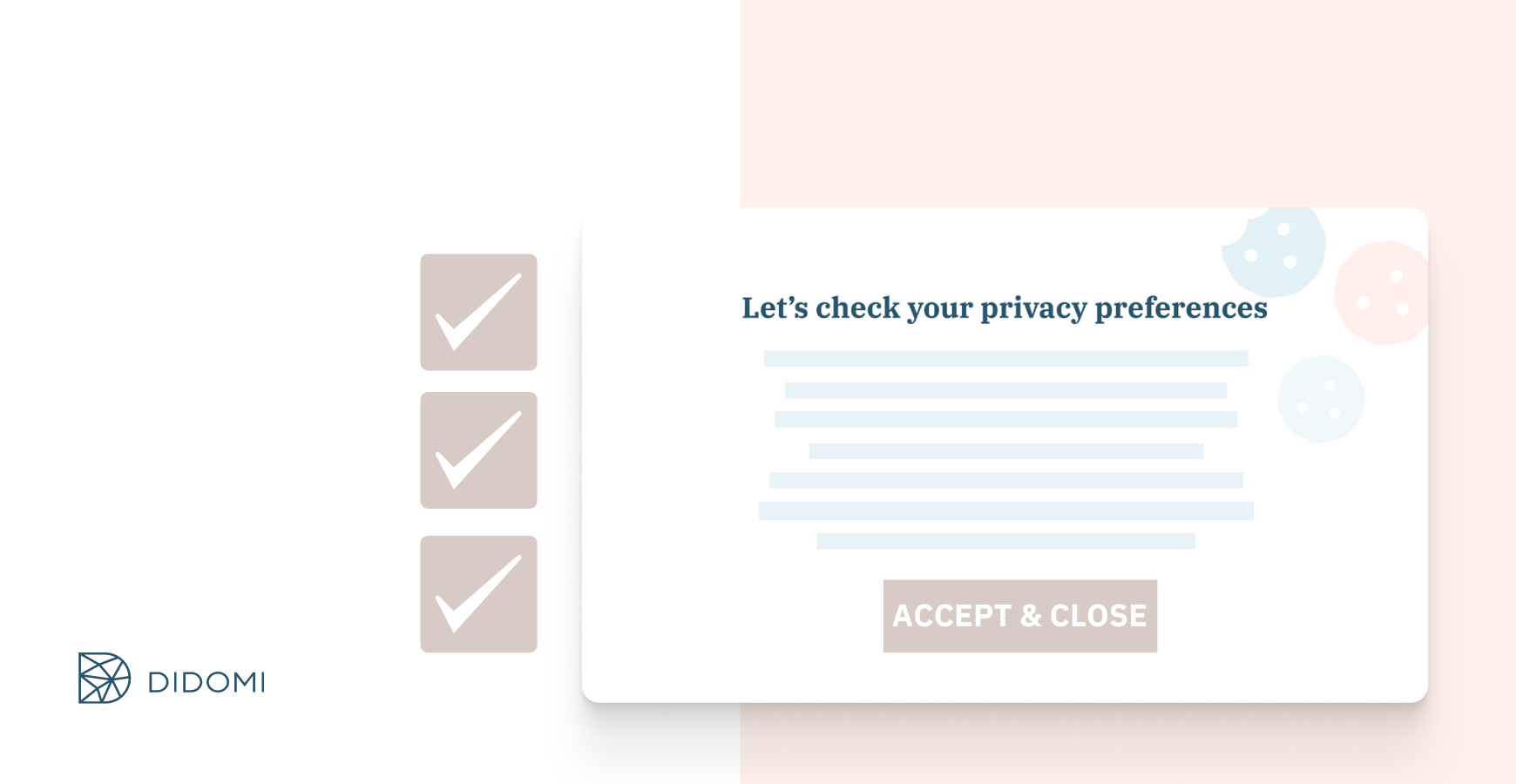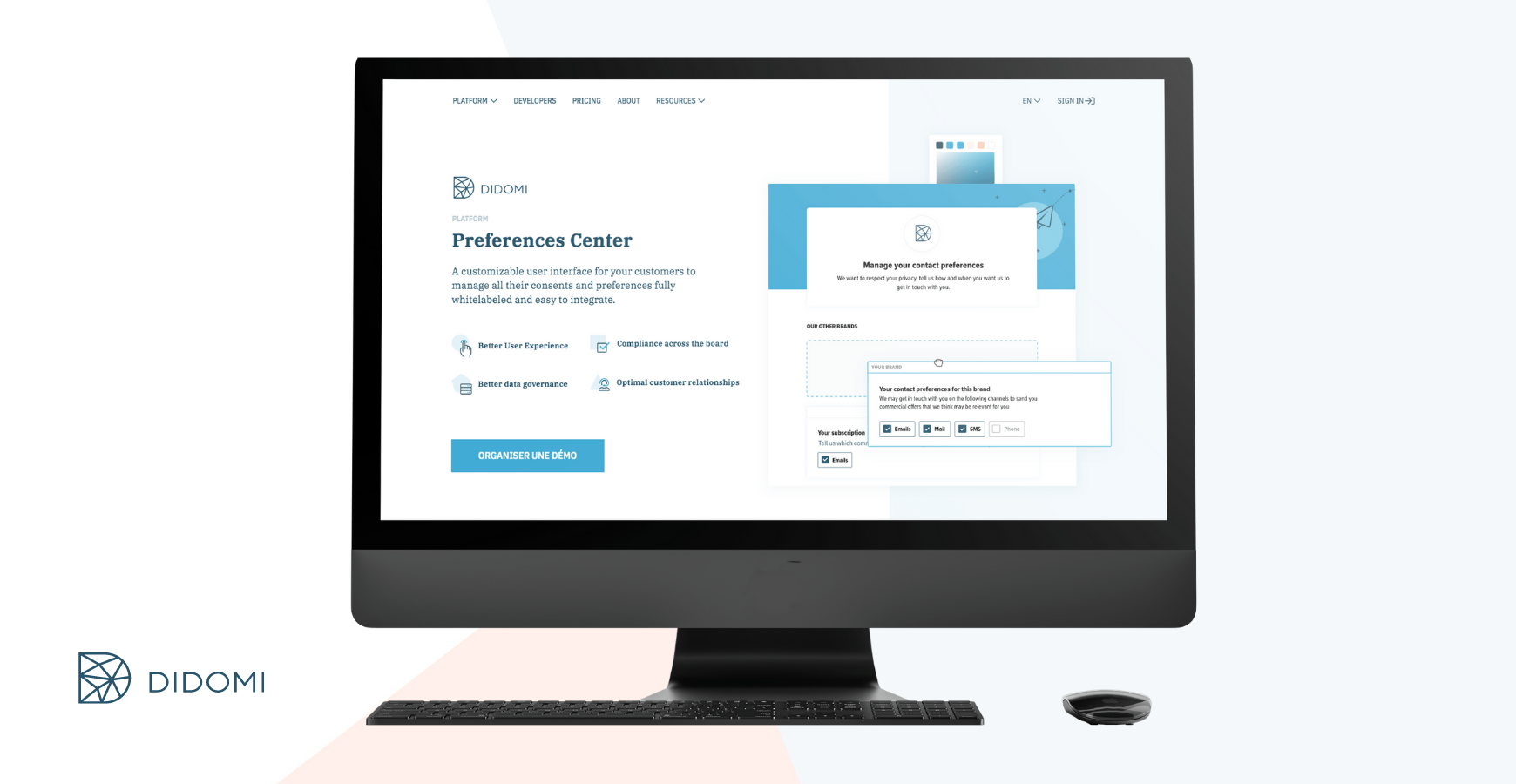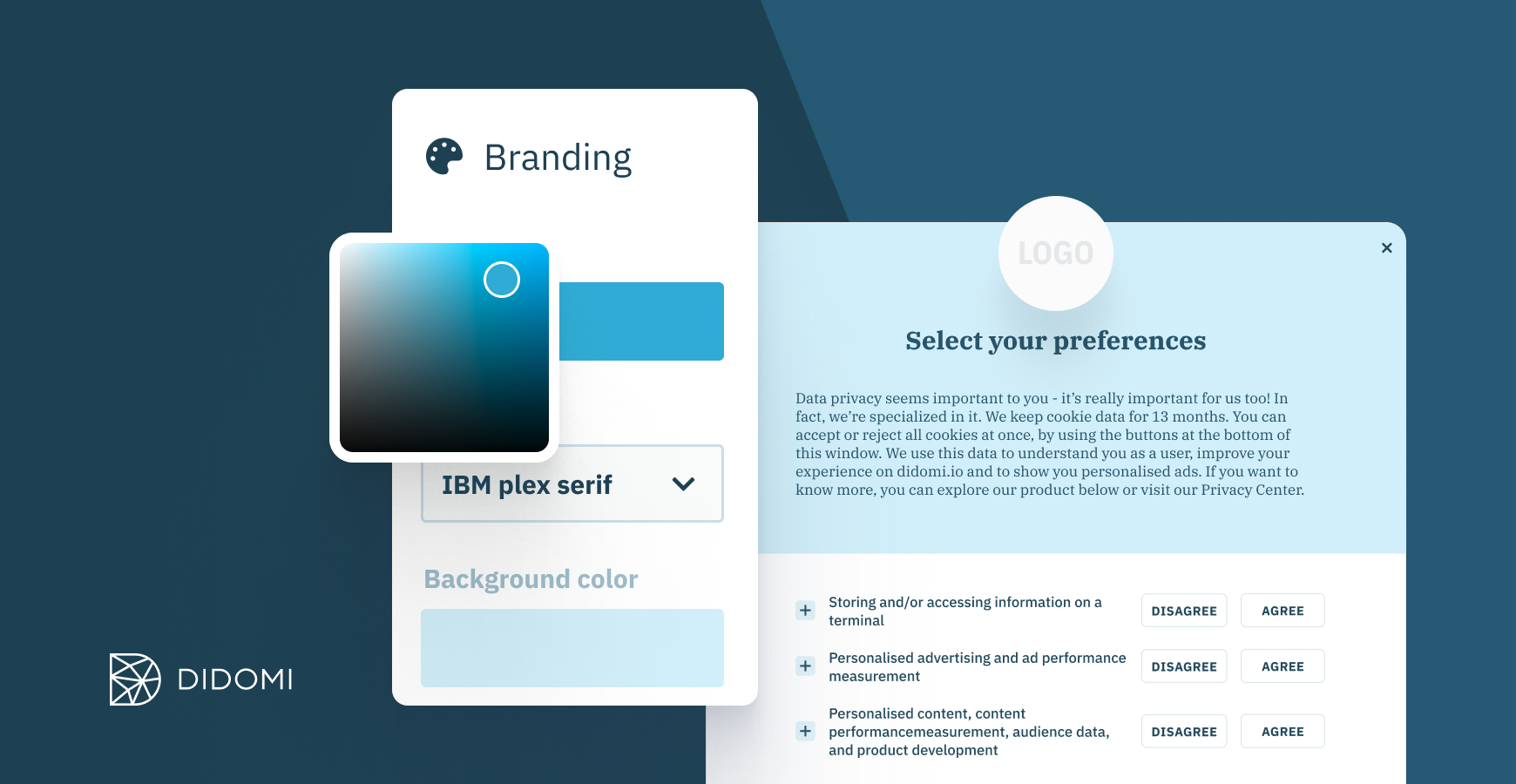Inspired by our recent webinar in which we discussed Why Consent is becoming one of the most important business KPIs to follow, we are creating a three part article series on consent as a business opportunity. This is Part 1, in which we will define consent as a legal basis, and explore whether it is a mere annoyance, or in fact full of business potential. Check back soon for Parts 2 + 3, on the role of Consent Management Platforms and Preference Centers in optimising consent collection!
Summary :
- What is consent?
- What makes consent collection so complex?
- Consent, an annoyance or a business opportunity?
- How Didomi can help
What is consent?
Since this article series will focus on consent, it seems fitting to first remind ourselves of its definition. Consent is termed by the GDPR as the first legal basis for data collection. In GDPR regulation, data processing is only lawful if it pertains to one of the following 6 legal bases:
|
6 legal bases of GDPR:
|
Consent: The most important legal basis for data collection
At Didomi, we believe that consent should be the main legal basis for data collection, because what is at stake is your customer’s knowledge, understanding and trust. We are certain that, in the “Privacy Transition” currently underway, consent will become a leverage for trust, and trust a leverage for revenue. Hence, consent really is a business opportunity.
Moreover, legitimate interest (consent's main alternative when it comes to legal bases for data collection and processing) is coming under increased speculation by multiple Data Protection Authorities (DPAs) in Europe. In recently issued guidelines, such as the recommendations of the CNIL (the French DPA), and the ICO (the UK DPA), consent has been the much favoured legal basis, especially when it comes to large data collection.
What counts as consent, exactly?
So, we know that consent is a legal basis for data collection, but what exactly is it, and how do we collect it? According to the GDPR, consent must be freely given, specific, informed and unambiguous, and “it shall be as easy for the user to withdraw as to give consent”.
Before GDPR, some websites were allowing you to opt-out, but now publishers must have a clear positive action from the user to signify consent. Users must be aware of the purposes of collecting their consent, and must be able to change their preferences at any time.
What makes consent collection so complex?
So, we know that consent is a reliable and relevant legal basis, but, given this, why is it not more often chosen? Perhaps because consent collection seems complex, and here are some of the reasons why.
Local DPAs have different GDPR applications
Depending on the DPA, the GDPR application can be slightly different when it comes to consent collection and tolerance. For example, the issues of cookie walls, or whether scrolling constitutes a clear positive action are hotly contested amongst DPAs.
CNIL vs Conseil D’Etat
The example of the recent CNIL vs Conseil D’Etat debate clearly illustrates the complexities surrounding consent collection. The CNIL announced that cookie walls were strictly forbidden, yet the Conseil D’Etat (the highest legislative body in France) contested that the French DPA cannot decide what is compliant or not. It can only apply sanctions according to what is explicitly mentioned by the GDPR.
European Court of Justice Planet 49 Judgement
Another concrete example of the complexities of consent collection is that of the Planet 49 judgement, in which it was deemed that pre-ticked boxes do not constitute a lawful form of consent. This ruling had a ripple effect in the entire advertising industry, even leading the IAB to update its Transparency and Consent Framework (TCF).
You can find out more about the Planet 49 Ruling in our article on the subject.
These examples clearly show the grey areas surrounding the border of what is compliant and what is not when it comes to consent collection. Want to see what a compliant versus a non-compliant consent banner looks like? Check out our article on this subject here.
Feeling overwhelmed? Didomi is the leading consent and preference management platform, providing comprehensive solutions to collect, store and leverage user consents and preferences for your business.
🎙️WEBINAR 🎙️
— Didomi (@Didomi_io) October 14, 2020
Personal #data is a key asset for companies, yet consumers are demanding higher #transparency and #control over their data. ☑️🚫
Compliance Specialist Jéhanne Zkhiri explains why #consent is one of the most important #KPI's to follow 👩🏫👨💻
👉 https://t.co/8a979dAkTJ pic.twitter.com/TLHP475Tr1
Consent, an annoyance or a business opportunity?
Given the complexities surrounding consent collection, how could it ever be seen as a business opportunity? To dive a little deeper into this debate, let’s look at the consequences of using consent as a legal basis.
Consent rates will undoubtedly be impacted
Yes, this is undeniable - consent rates may be impacted in volume, which might make companies think they know less about their consumers. If you give users explicit choice, some will undoubtedly opt-out. This doesn’t seem to be helping the argument that consent is more than a mere annoyance…
Consent will be worth much more
However, whilst there will be a decrease in volume, all the data that you have will be much more valuable as it was given voluntarily. Therefore, in terms of quality and relevance it will be more useful. Compliance by consent raises the client’s knowledge, building trust between customer and brand. Understanding your customers better is not about more data, it’s about more trust. And, the leverage to build trust is compliance. The more compliant you are, the more trustworthy your brand is, and the more revenue you generate.
This is the fundamental reason why we believe consent will become one of the most important business KPIs to follow. Compliance equals trust, and trust equals revenue.
🔄 WEBINAR REPLAY 🔄
— Didomi (@Didomi_io) October 21, 2020
Why has #consent become a key indicator for companies?
Is it really a business annoyance, or could it in fact become a business opportunity?
Access the full #webinar here👇 @lexology https://t.co/EZPtFXMIUE pic.twitter.com/rMW5aor3Ko
How can Didomi help?
How can my company optimise consent collection, and ensure that consent becomes a business opportunity? Well, this is where Didomi steps in to help. We will talk more about different ways to optimise consent in the other articles of this series, but let us quickly introduce you to our consent and preference management solutions.
Didomi has developed two products, the Consent Management Platform (CMP) and the Preference Center, which allow you to optimise consent over multiple channels both online (CMP) and offline (Preference Center). These are tools for recording, storing and retrieving consent, transmitting it to different partners when appropriate. They make user experience more fluid and the process of consent collection easier.
Our solutions are live on over 160k websites and apps, and we support companies in the transition from consent as annoyance, to consent as a business opportunity.
Yes, there are annoyances involved in consent collection, but at Didomi we really believe it is the way forward in terms of generating trust amongst your users, and therefore generating revenue.
Gartner agrees, as they predict in their Gartner Market Guide for Consent and Preference Management that, through 2023, organizations that can instill digital trust will be able to participate in 50% more ecosystems to expand revenue generation opportunities.
Don’t forget to keep an eye out for the other articles in this series in which we delve deeper into the Didomi solutions, and book a demo with us if you’d like to find out more about the potentialities of consent for your company.











